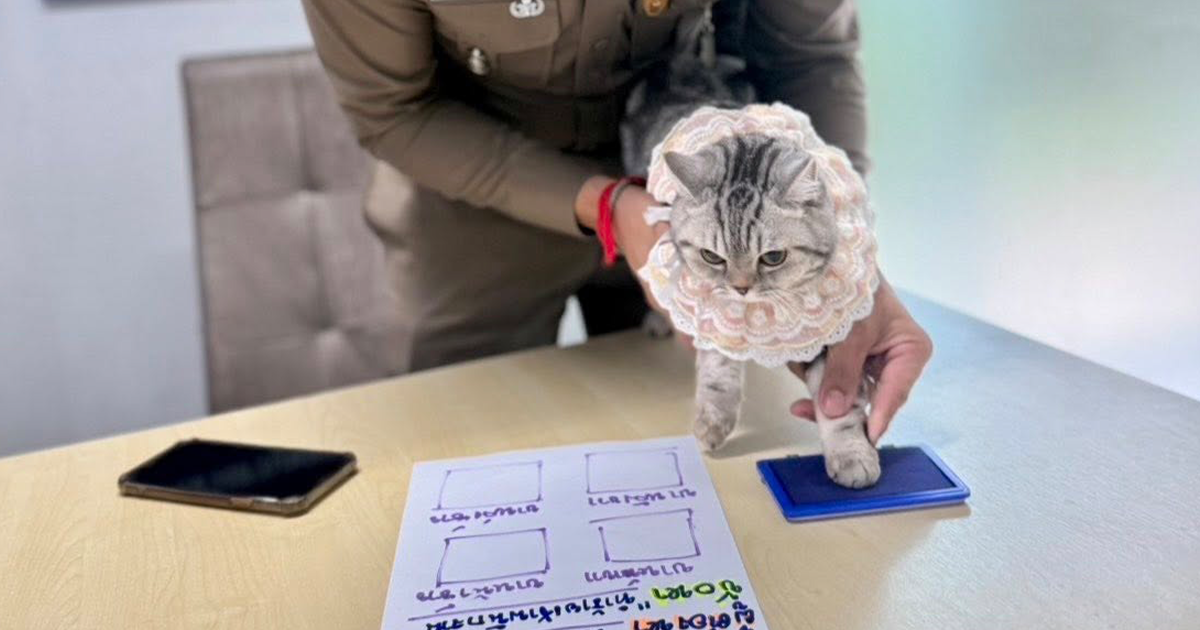Redditor Asks If She's An A**hole For Not Letting A Little Girl Pet Her Dog, Because Her Mother Sure Thinks So
Dog ownership is a big responsibility, and it's incredibly important to understand a dog's body language as much as possible. This is especially true when a dog is interacting with other people.
Reddit user u/Temporary-Compote164 recently shared an experience she had with her dog in the AITA (Am I The A**hole?) subreddit. The OP explained that her dog is very friendly, but can sometimes be reactive when he gets stressed.
For that reason, the OP's dog usually wears patches that say "In Training" or "Do Not Pet." However, on this particular occasion, the patches were being washed, so the OP took her dog walking without them.
They came across a little girl who asked if she could pet the dog. Before the OP could answer, her mom told her she could.
The little girl got right in the dog's face and put her arms around his neck. The dog immediately started licking his lips, which the OP knew was a sign of stress. He was trying to get away from the little girl, so the OP grabbed his collar and pulled him back.
The OP felt bad that the little girl was sad, but, understandably, she didn't want to risk her dog biting the child. Especially since if he did, he would most likely need to be put to sleep.
The OP was upset with her mother for undermining her judgment and telling the little girl she could pet the dog. She explained that her mom always dismisses her when she mentions the dog's body language.
So, is the OP the a**hole here? Keep scrolling to see how people reacted.
The OP asked if she's an a**hole for not letting a child pet her dog.

She explained that her dog is friendly but can also be reactive and becomes stressed easily.

So, when a little girl asked if she could pet him, the OP was going to say no until her mother jumped in and said yes.

Understanding Pet Ownership and Child Interaction
Interactions between children and pets can be complex and require careful supervision. Dr. Victoria Simmons, a child development expert at the University of Minnesota, emphasizes that children's understanding of animal behavior can vary widely with age.
This variability means that what seems harmless to an adult might be perceived differently by a child, potentially leading to dangerous situations.
The OP's dog seemed stressed, so she grabbed his collar and pulled him away from the little girl.

Now the OP is wondering if she's an a**hole for making the little girl sad.

In an edit, the OP said she was upset because her mom also said she should have let the little girl cuddle the dog.
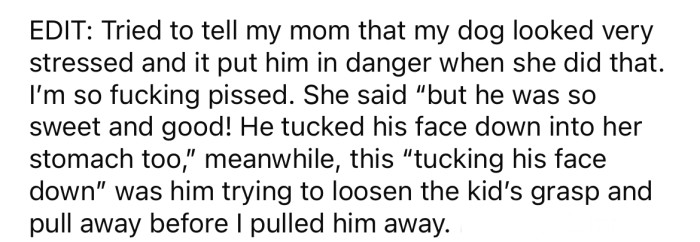
Research shows that children often need guidance in understanding boundaries with animals. According to studies published in the Journal of Child Psychology, teaching children how to appropriately interact with pets can foster empathy and responsibility while ensuring safety.
Children who learn these boundaries are less likely to engage in risky behaviors around animals.
The OP says her mom always dismisses her when she mentions her dog is getting stressed.

Here's how people reacted.
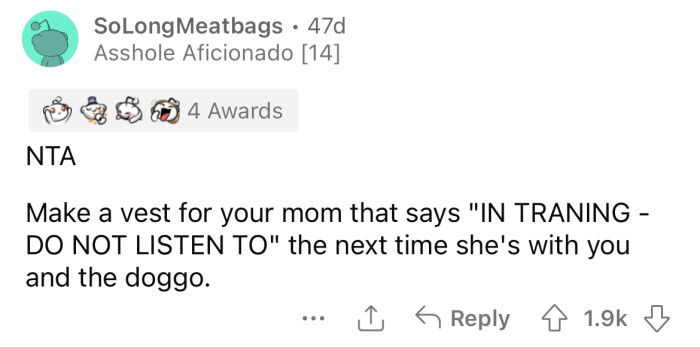
"That could have ended very badly."
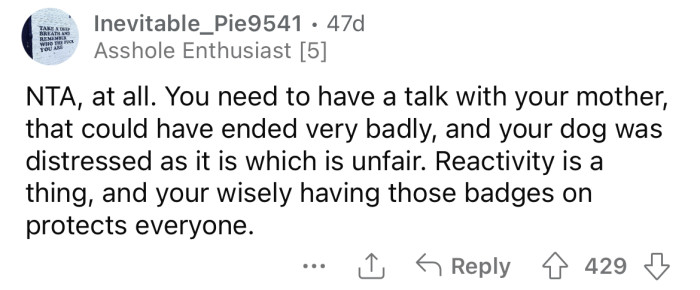
Promoting Safe Interactions
Ensuring safe interactions between children and pets is essential for both parties' well-being. A behavioral psychologist notes that positive reinforcement strategies can be effective in teaching children how to interact safely.
For example, rewarding children for gentle interactions with pets can reinforce desirable behaviors and promote a sense of responsibility.
NTA.

"It wasn't her dog to give permission for."
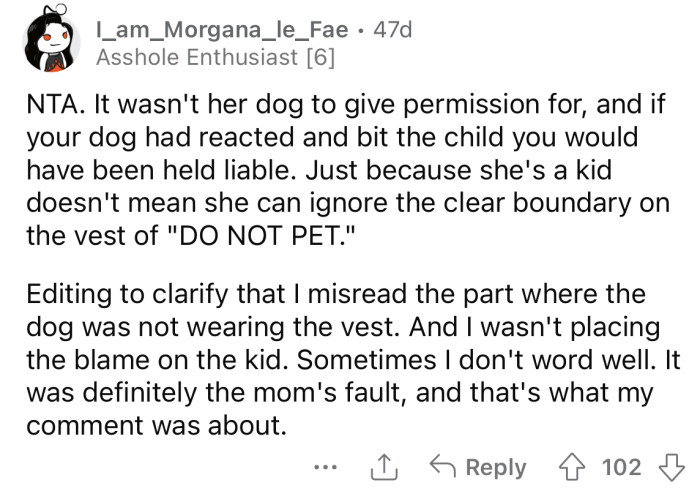
"Tell your mother to stop answering for you."
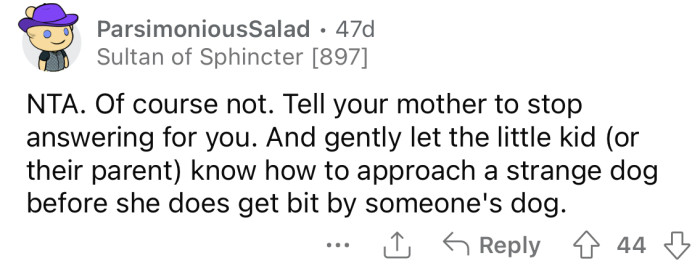
To address the concerns raised, it might be beneficial for the Redditor to communicate clearly with the child's parent about the risks involved in allowing the child to pet the dog. Setting up a meeting to discuss safety protocols can help ensure that both parties feel comfortable.
Additionally, demonstrating safe interactions with the dog can serve as a learning opportunity for the child and their parent.
Yeah, moms. Why?

"Might I suggest a leash sleeve?"
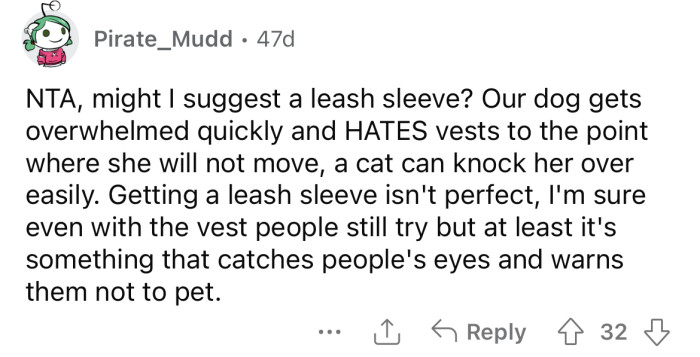
"Great job."

"Kudos to you for recognizing your dog's stressors."
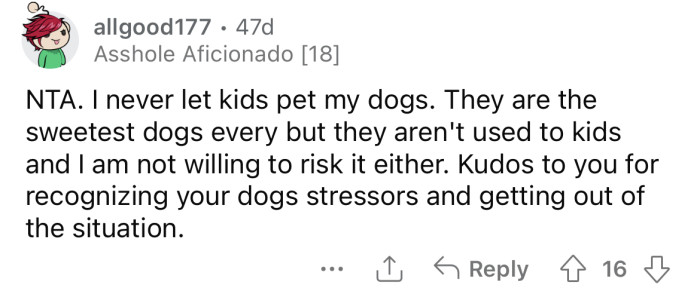
"Your dog was clearly anxious."
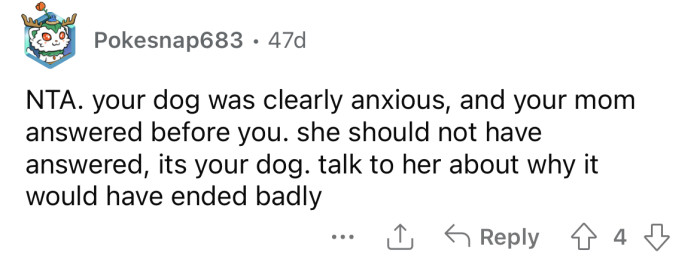
Consult "the googs."
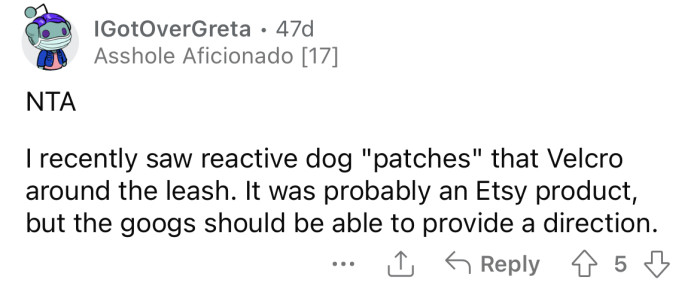
"He bites."

"You are clearly a responsible dog owner."
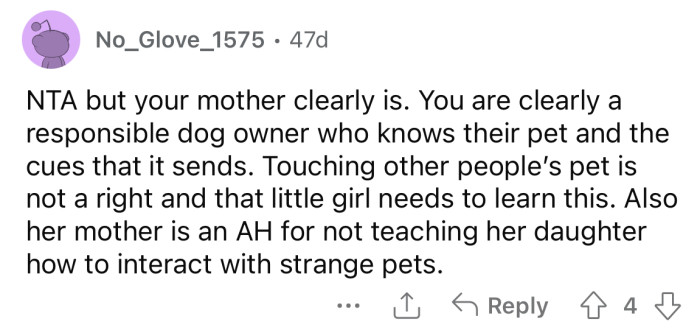
What's your take on this situation? Do you think the OP was overreacting, or was she right to pull the dog away when she noticed he was showing signs of anxiety?
We would love to hear your opinions on this. You can share your thoughts with us in the comment section.
Expert Opinion
This situation highlights the importance of understanding child behavior around pets. It's common for parents to feel conflicted when their child expresses interest in interacting with animals, especially when safety concerns arise.
Analysis & Alternative Approaches
Understanding the dynamics of child and pet interactions is critical for ensuring safety and fostering positive relationships. By promoting open dialogue and teaching boundaries, caregivers can create safer environments for both children and pets.
Ultimately, fostering empathy and responsibility in children can lead to more harmonious interactions with animals.

